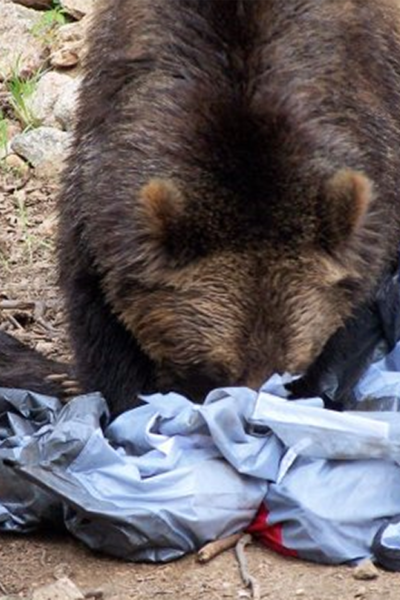American black bears in Colorado will start coming out of hibernation soon, and they’ll be hungry after a winter in the den. Although we don’t have any native species of black bears at Cheyenne Mountain Zoo, we’re advocates for doing all we can to keep wild animals wild. No matter the species, it’s never a good idea to feed a wild animal – on purpose or by accident. In some cases, feeding wildlife is illegal.

Early risers can make a difference and save bear lives. When it’s trash day, put trash out the morning of pick-up. We have bear-safe trash receptacles throughout the Zoo, and similar models are available for residential properties. If you don’t want to invest in a bear-safe trash receptacle, keeping your trash cans in a garage or shed is a good option to help keep bears out of trouble. Bears think garbage smells amazing and if they can get into it, they will.
“With five toes on each paw, bears are incredibly dexterous,” said Rebecca Zwicker, Rocky Mountain Wild animal manager. “Over time, they learn how to use their dexterity to open doors and containers, so it’s up to us to stay one step ahead of them.”
Bears also love birdfeeders. They love sunflower seeds and other seeds, and especially love hummingbird food. When a bear eats from a birdfeeder, it’s probably going to destroy that bird feeder and eat all of the food you bought for the birds. Also, once they find a food source, they’ll often come back to that area, which creates a potential for surprise visits in your backyard. Take bird feeders down at night when bears are most active, or just hang bird feeders in the winter, when the bears are asleep and the birds are really searching for food.

Black bears can smell a meal from up to 20 miles away. Once they smell and find a campsite, they’ll start searching for food. When you’re camping, keep food outside of your tent, so you’re not inviting bears to investigate your sleeping quarters. Keep food locked in a bear-safe container or hang your food from a rope, high off the ground and away from something a bear could climb. Bears are attracted to things like s’mores and meat, but also toothpaste and coffee. If it smells interesting, a bear wants to check it out.
“Bears are intelligent, and they have really great memories,” said Zwicker. “Once they’ve found a source of something yummy, you can bet they’ll be back for more.”
Once a bear comes into human spaces, they’re given the term ‘nuisance bear.’ They’re tracked and usually only get a few ‘strikes’ before they have to be killed, or in some rare cases relocated. That’s why it’s so important that we help prevent opportunities for them to become a nuisance.
“Seeing a bear in the wild is magical,” said Zwicker. “Their presence is part of what makes Colorado so special, but it’s up to us humans to protect these curious creatures from themselves. If you can follow these simple tips, you could save a bear’s life.”

